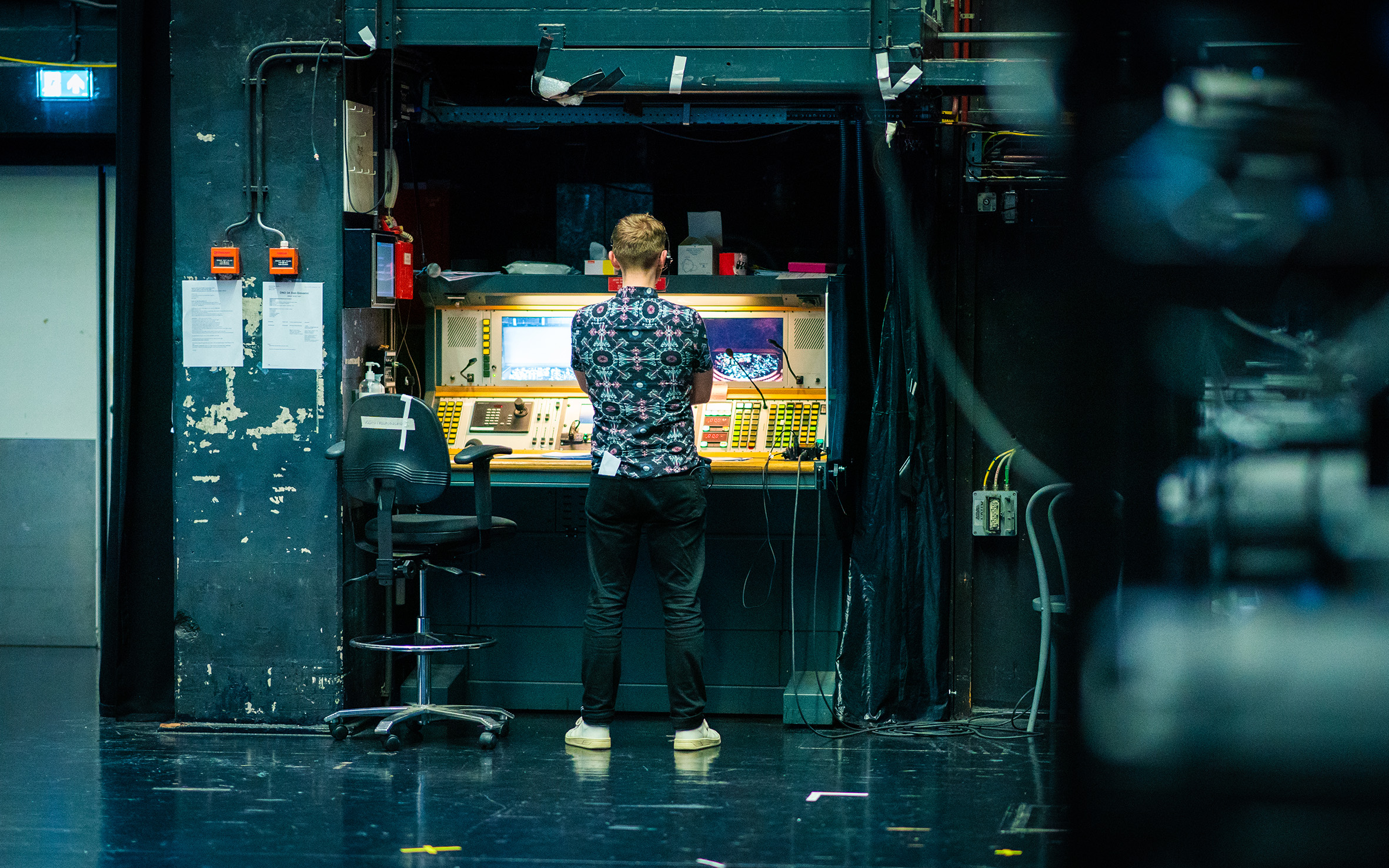
Behind the scenes: the stage manager
What the audience sees on stage is basically just one side of the performance. Behind the scenes, there is a whole other performance going on. In this second performance, it is set changes and lighting cues rather than opera singers or ballet dancers that play the lead roles. This is where the conductor and the stage director hand over the reigns to stage managers such as Pieter Heebink.
Text: Rosalie Overing
Even when still a student of Production and Stage Management, Pieter Heebink knew exactly what he wanted to do for work: be a stage manager at a musical, ballet or opera company. He felt that this would be the best choice for him in terms of versatility. After a number of internships and freelance jobs in these three disciplines, he joined DNO&B as a stage manager three years ago and his versatility has paid dividends. ‘Because I was hired after the merger (between Dutch National Opera, Dutch National Ballet and Het Muziektheater in 2014 – ed.), I work on both opera and ballet productions, as well as on what we call “side projects”, which is an umbrella term for all atypical productions, such as the International Young Patrons Gala or the Children’s Chorus Festival.’
Opera versus ballet
Each of these types of productions calls for a different approach and that is why the duties of a stage manager at DNO&B vary from one production to the next. With ballet, the work of a stage manager does not start until the dancers begin stage rehearsals. With opera, the stage manager is closely involved right from the time the singers start studio rehearsals. Pieter: ‘At that point, our role is mainly facilitating. We make sure the rehearsals run smoothly and that the artistic team have everything they need. If members of the chorus are expected to wear bulky gowns on stage, for instance, we’ll talk to the costume department and ask them to produce rehearsal gowns. You can’t expect the actual performance to go off without a hitch if the performers haven’t rehearsed in clothing that resembles their stage costume.’

The role of the stage manager changes as soon as stage rehearsals begin. Pieter: ‘In opera productions, we usually work with a showcaller, a senior stage manager and one or two assistants. As a showcaller, you sit behind a giant desk with different screens. One shows you the conductor, another gives you a general overview and a third is an infra-red image. You wear a headset and, based on the score, you call the cues to the senior stage manager and the assistants, who’ll pass them on. These aren’t just cues for lighting and set changes, but also for the entrances of the conductor, soloists and chorus members. The senior stage manager heads up the floor team and makes all the important decisions.’ Which stage manager takes on which role varies from one opera production to the next. The team members decide among them how the work will be divided. In ballet productions, there are only two stage managers for stage rehearsals: one serves as the showcaller and the other acts as the central communication point between the artistic team and the stage. They usually only need the showcaller for the actual performance. Pieter: ‘That’s because we don’t have to call any cues for dancers to enter the stage. They know exactly when it’s time for them to make their appearance.’
Rock and roll
The differences between the work of a stage manager in opera and ballet productions are small compared to those between regular productions and side projects. ‘There’s typically much less rehearsal time for side projects, which means we have to rock and roll, as we call it, a lot more on the day of the performance,’ Pieter explains. ‘That makes for an interesting contrast between an opera, which takes four weeks of studio rehearsals followed by two weeks of stage rehearsals, and a production like the International Young Patrons Gala, which we have to put together in just two days.’ Another example of an ad hoc side project was the benefit for Ukraine. ‘The opera Eurydice – Die Liebenden, blind ended at 4:15 on the afternoon of the benefit. We had until 6 p.m. to completely transform the stage and then until 7:30 p.m. to rehearse. The doors opened at 7:45 p.m., which was when everything had to be ready for the audience. Urgent projects are exhilarating, but I wouldn’t want to do them every day. When it’s just go, go, go, I sometimes catch myself thinking that it’d be nice to be sitting in the studio and listen to the same aria for the sixth time that day. Working on longer-running projects definitely has its charms too!’
Live performance
One of Pieter’s favourite runs as a stage manager was the production of Missa in tempore belli, which had its world premiere in September 2021. Pieter: ‘For me personally, all the pieces of the puzzle came together in this production. It had opera and ballet, a large chorus, electronic music, numerous lighting and set changes, and a whole lot of video. I was the showcaller, which was no mean feat because of the huge number of cues. Missa in tempore belli truly embodied the complexity of our profession and showcased the beauty of our cross-disciplinary teamwork in a single stage production. At times like those, I almost feel like a musician: as a showcaller, I follow the conductor’s lead and simultaneously translate their cues to the floor. From that perspective, we stage managers arguably deliver a live performance as well. The excitement of the live experience, the feeling that everything has to come together at the exact right moment and the shared quest for perfection, that’s why I love working in the theatre.’



